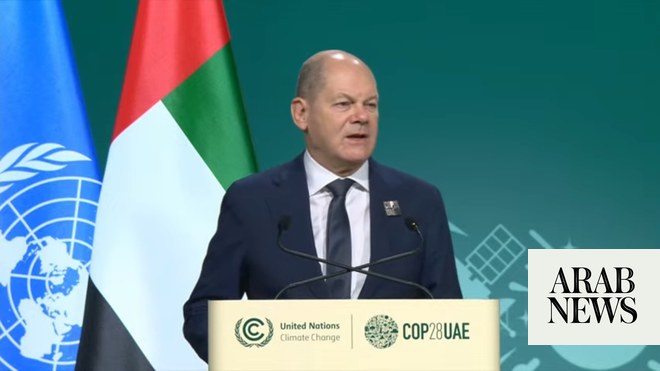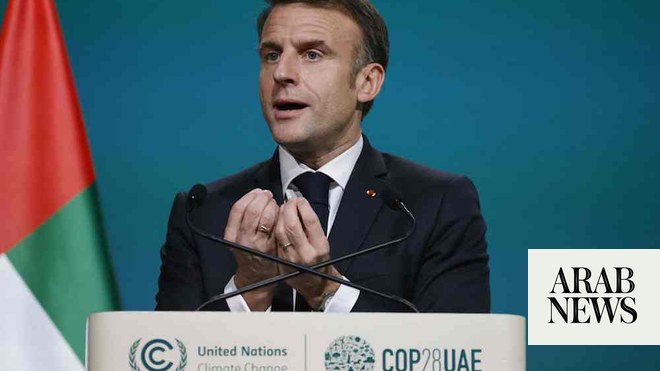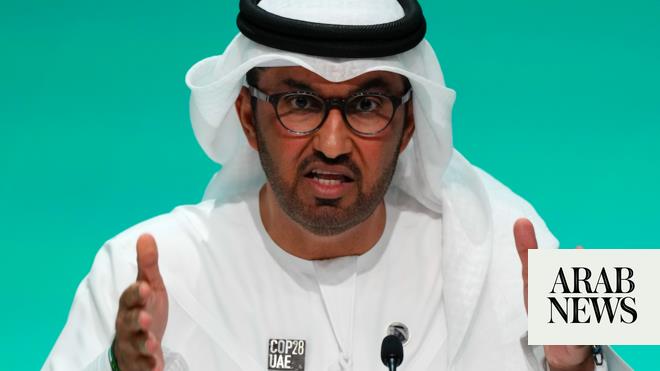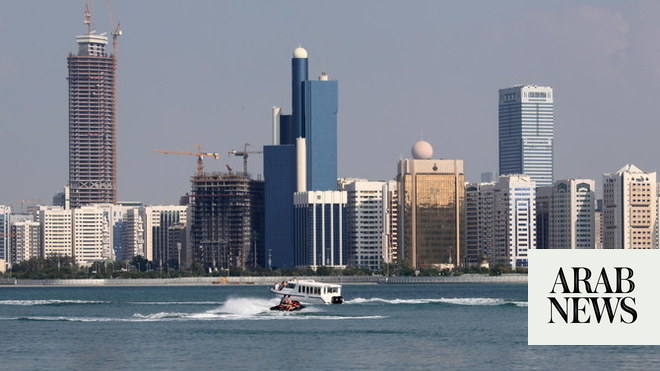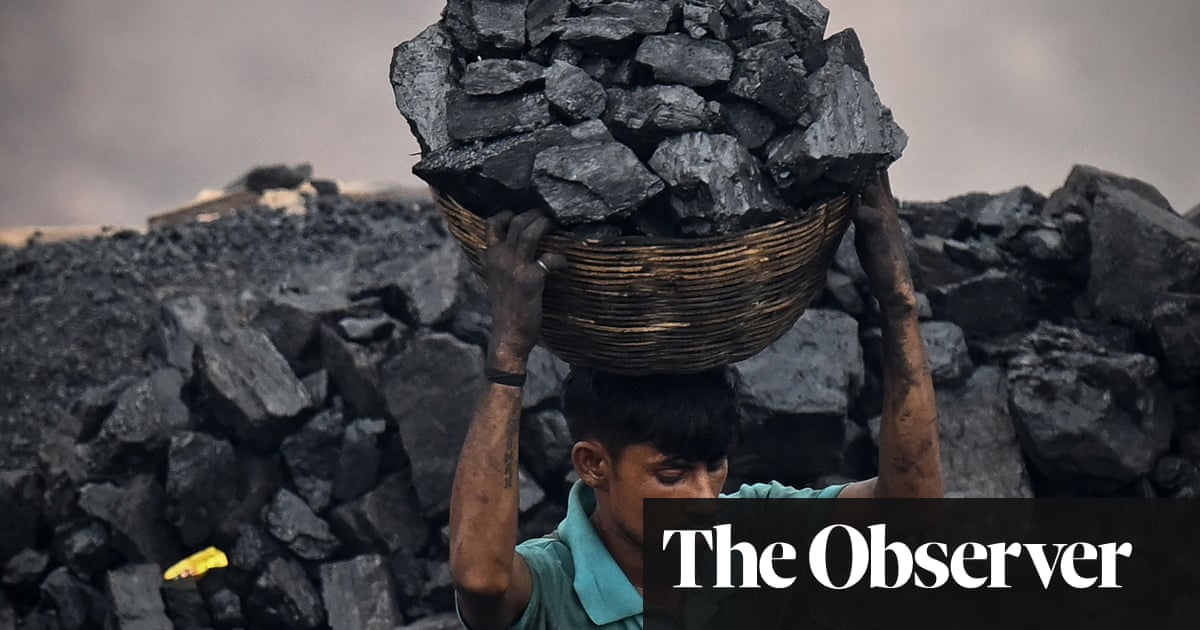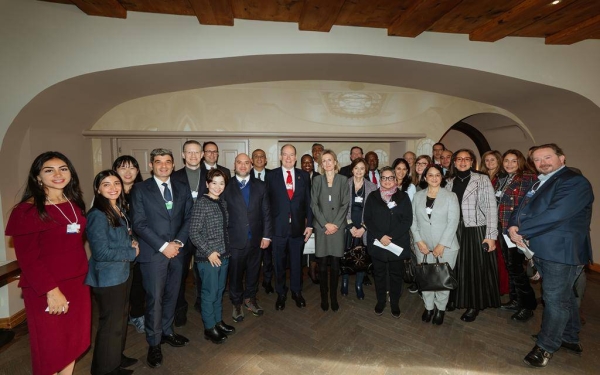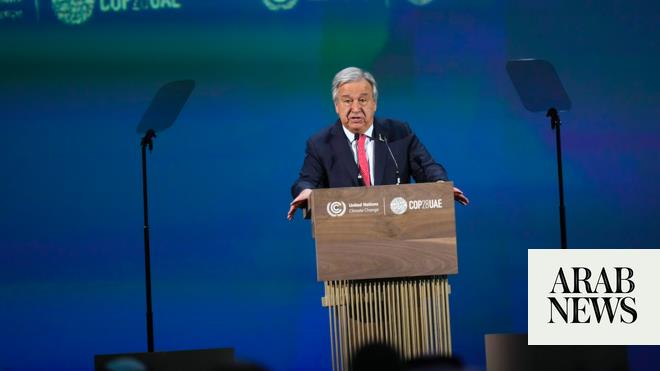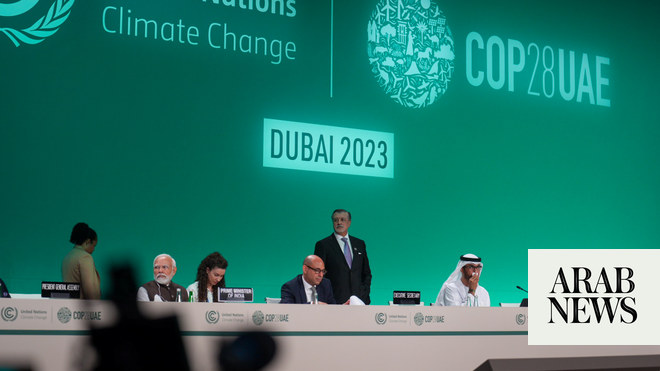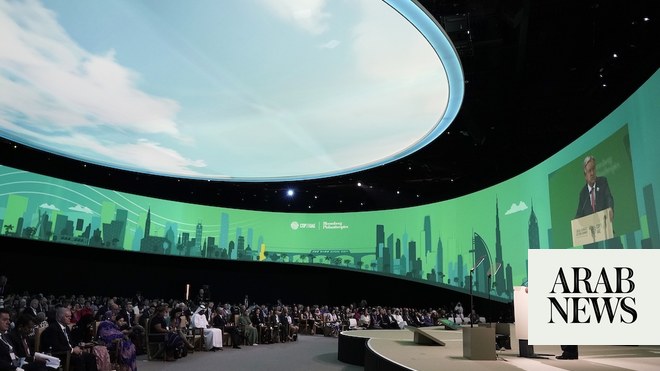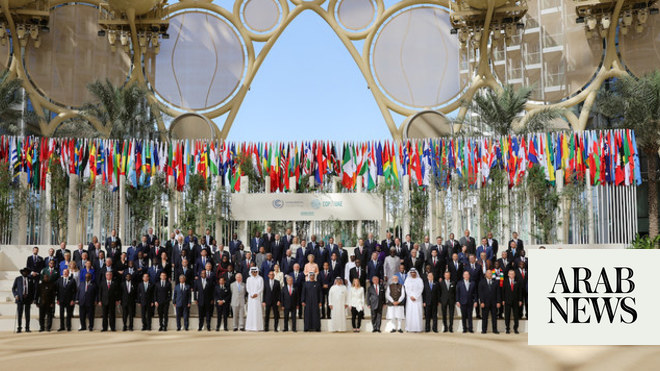
DUBAI: Capitalizing on the positive momentum from the opening day of the UN Climate Change Conference in Dubai, global leaders, including heads of state and governments from over 117 countries, gathered at Expo City to set ambitious goals for transitioning toward more ecological and less carbon-intensive economies.
The boost to the mood was spurred by the announcement on Nov. 30 activating the “loss and damage fund” — a financial mechanism designed to assist countries affected by climate change. This initiative was endorsed last year during COP27 in Sharm El-Sheikh, Egypt, with the specific operational details ironed out just hours before the commencement of COP28.
The operationalization of the “loss and damage fund” appears to have instilled a lot of confidence among participants at COP28, including leaders such as Kenyan President William Ruto, who welcomed the announcement as a sign of progress.
“We are seeing signs of progress for the first time. The ‘loss and damage fund’ is now being operationalized with real money. The conversation here has changed dramatically. I think there is a renewed commitment to making sure that we match action with what we’ve seen many times,” Ruto told Arab News.
He mentioned that he is aware of one of the problems associated with past meetings on climate change: there is rarely any follow-up to the lofty statements made during these gatherings.
“The accusation has been (that) we talk too much and there are no results. But I am very impressed with what I am seeing; there is now tangible progress being made. And hopefully, by the end of this COP, we will not only have significant resources deployed but also serious commitments made,” Ruto said.
African initiatives
Even though it ranks at the bottom of the list of continents in terms of carbon emissions, Africa has been at the receiving end of the negative impacts of climate change, especially through cycles of alternating prolonged droughts and flash floods.
In such a scenario, it is hardly surprising to see a large African delegation at COP28, and many African nations are now taking the lead in speaking up for themselves and launching their own initiatives. For instance, Ruto informed that Kenya was all set to announce a number of new initiatives.
He added: “We will be launching later today (Friday), with France, an agreement that will give us the opportunity to discuss taxation as a new mechanism for bringing resources for sorting out climate change that is threatening the whole globe. Secondly, we are also having a serious conversation about the Africa Green Industrialization Initiative to unlock the huge potential and opportunities that exist in Africa for green manufacturing, which is, if I may say, the silver bullet for growth into the future.”
Even on the issue of finance, which has blighted practically every single COP summit, Ruto seemed optimistic. “We need billions of dollars for climate adaptation, which is precisely why we are having a conversation about money already committed, and we are seeing traction in that money being released. That’s number one. Number two, we are looking at an opportunity where we have all agreed on a new international financial architecture that is, again, going to be much more fit for purpose with additional resources, with more money. And then number three, we are looking at new avenues of raising money, including carbon taxation and taxation on industries that will get more people on board,” Ruto said.
Croatian Prime Minister Andrej Plenković said that the main objective of this COP is to expedite investments in green transition. “The main objectives here seem to be to speed up the investments in energy efficiency, to speed up the investments in the energy transition and also the diminishment of the use of the fossil fuels.”
There were some substantive declarations on Nov. 30 but Plenković expressed his expectation that, over the course of the next couple of days, as confidence builds, “there will be more money available.”
For Plenković, besides finance, another key development at COP28 is the global stocktaking that is taking place where various countries make a statement on where they stand currently vis-a-vis their commitments under the Paris Agreement for curbing their carbon emissions.
“I believe that the exercise of global stocktaking is a necessary requirement for phasing out carbon in a fashion that is timely, intelligent, swift and systematic. I think that the political will is here and that a lot of ambition in order to fulfill, first of all, the Paris Agreement objectives. And I think the awareness has been really raised to the maximum level,” Plenković told Arab News.
He said that his own country is moving rapidly toward a green transition across various sectors. “Well, we are investing heavily at the local level because, in a global sense, we are not a country that is polluting a lot. Our emissions are very low. On the contrary, they are below the thresholds that we have. But we are doing maximum to increase our investments in energy transition and energy efficiency.”
The Croatian prime minister emphasized on the tourism sector because his country ranks as the 18th destination in the world in terms of guests, with the arrival of 20 million tourists. This figure is significant for a nation of less than 4 million people. “We put this in the context of global development goals. Therefore, all of our investments are aimed at balancing economic growth, maintaining a protected environment, and reducing emissions,” Plenković said.
He added that the EU was very deeply engaged with climate change, not just internally but also at a global level. “There is no European Council that passes without climate as an issue and I think that we are really committed to provide as much as we can, both in terms of institutional framework investments and support to the countries that are in need,’’ Plenković explained.
Funding gap
However, not everyone seemed content with the developments and the pace of change. Miguel Ceara Hatton, minister of environment and natural resources of the Dominican Republic, said he is very concerned about the “loss and damage fund” proving to be inadequate. “We understand that there is not enough money for the 183 countries. If we talk about this, $100 billion is not enough. If we have to change our way of production, consumption and transportation, then we need much more than what is currently there, especially if we are talking about 183 countries,” Hatton told Arab News.
He added: “This crisis, the climate crisis is occurring at the same time in all countries in the world. So, for that reason, everybody needs money at the same time in order to get the transformation.”
Hatton felt the problem is that, in the end, each government has to be prepared to finance the changes. “But also, we try to get money from outside of the country, which is not going to be enough. But, in any case, we have to do the transformation. That’s the point, and that is adaptation,” he explained.
The Dominican Republic currently faces several challenges due to the climate crisis, Hatton informed. “The main problem is that we have a severe growth of Saragossa, a seaweed that is growing due to warmer seas. We also have the issues of transition of our energy and transportation. These are the three main things that we have to resolve in order to advance in the (fight against) climate change,” he said.
Despite the issues, Hatton said that he stays positive. He added: “Yes, we are optimistic. Yesterday (Friday) was a good day. And I think that we are moving. Not so far, not so quickly. But we are moving very slowly. Very slowly. But I hope to gain speed.”
The optimism despite challenges was also shared by Dan Smith, director of the Stockholm International Peace Research Institute, a think-tank that specializes in the study of conflicts and wars around the world.
“Events like COP are very important. But don’t expect anything to be revolutionized next week, next month, or even next year. Probably in a year’s time when COP29 comes, we will still be saying, look, we have to be more aware of this linkage. We have to do more about it, and we have to grip the problem better. But the awareness is rising,” Smith told Arab News.
He said the change in policy is visible. For example, more and more UN missions, international agencies, and indeed governments have advised them specifically on the link of climate and security attached to their operations. “So, there is progress. It’s slow. That’s not enough, but it’s something that’s good,” he explained.
Smith said that there was a direct connection between climate change and conflicts, a hypothesis that his institute has been studying for decades. “I think that maybe 10 or 15 years ago, we believed that there would be a connection between climate change and increased risk of conflict. Today, it is no longer speculation.”
Unfortunately, he said the hypothesis turned out to be correct, and “it is very clear that there is an increasing number of armed conflicts in which the impact of climate change plays a part in creating the conditions.”
“It also plays a part in making some conflicts harder to resolve. It makes it difficult sometimes for the UN operations in the way it should, where you have extreme weather events happening. It also offers a chance for the insurgents, the militia, and the jihadists to exploit that, too. Very often they are the first providers that are the first ones to come when there’s a flood, and then they actually increase their recruitment as a result,” he said.
Despite the positive mood around, for some NGOs (non-governmental organizations) like Terre Policy Centre, a Pune-based environmental policy organization, the real challenge lies in the day after COP28 gets over. “The issue of implementation and activation of all that has been said at the climate summit,” said Vinita Apte, chairperson of Terre Policy Centre.
“Today (Friday), we heard Indian Prime Minister Narendra Modi, who gave a very good speech about green credit initiatives that India is launching. We have also seen many other leaders make major announcements. I always see people like the presidents and prime ministers come, and they give their statements and then they leave. Little of what is said is implemented and ultimately, it is for the common people around the world to deal with the aftereffects of climate change. But at least the governments should ensure that they help the populations and the NGOs deal with the challenges and provide finance,” Apte told Arab News.




